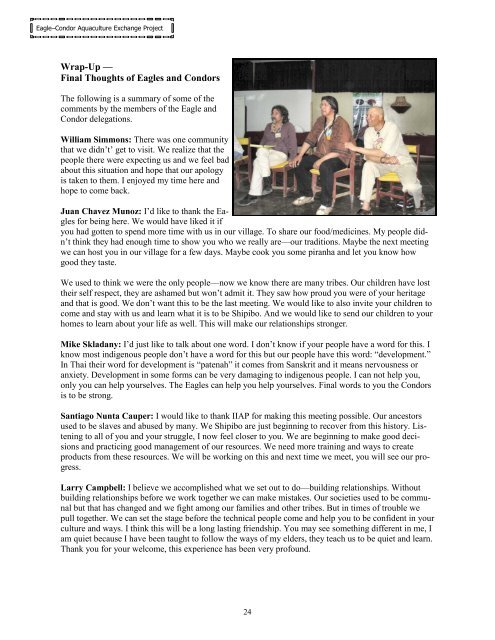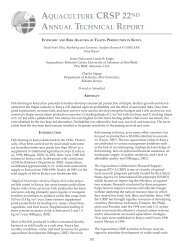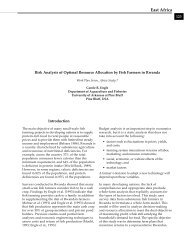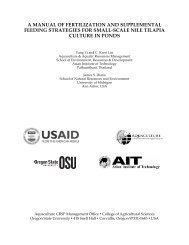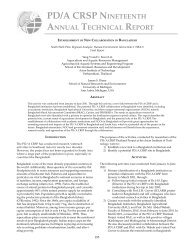Introduction — Eagle-Condor Aquaculture Exchange Project
Introduction — Eagle-Condor Aquaculture Exchange Project
Introduction — Eagle-Condor Aquaculture Exchange Project
You also want an ePaper? Increase the reach of your titles
YUMPU automatically turns print PDFs into web optimized ePapers that Google loves.
<strong>Eagle</strong>–<strong>Condor</strong> <strong>Aquaculture</strong> <strong>Exchange</strong> <strong>Project</strong><br />
Wrap-Up <strong>—</strong><br />
Final Thoughts of <strong>Eagle</strong>s and <strong>Condor</strong>s<br />
The following is a summary of some of the<br />
comments by the members of the <strong>Eagle</strong> and<br />
<strong>Condor</strong> delegations.<br />
William Simmons: There was one community<br />
that we didn’t’ get to visit. We realize that the<br />
people there were expecting us and we feel bad<br />
about this situation and hope that our apology<br />
is taken to them. I enjoyed my time here and<br />
hope to come back.<br />
Juan Chavez Munoz: I’d like to thank the <strong>Eagle</strong>s<br />
for being here. We would have liked it if<br />
you had gotten to spend more time with us in our village. To share our food/medicines. My people didn’t<br />
think they had enough time to show you who we really are<strong>—</strong>our traditions. Maybe the next meeting<br />
we can host you in our village for a few days. Maybe cook you some piranha and let you know how<br />
good they taste.<br />
We used to think we were the only people<strong>—</strong>now we know there are many tribes. Our children have lost<br />
their self respect, they are ashamed but won’t admit it. They saw how proud you were of your heritage<br />
and that is good. We don’t want this to be the last meeting. We would like to also invite your children to<br />
come and stay with us and learn what it is to be Shipibo. And we would like to send our children to your<br />
homes to learn about your life as well. This will make our relationships stronger.<br />
Mike Skladany: I’d just like to talk about one word. I don’t know if your people have a word for this. I<br />
know most indigenous people don’t have a word for this but our people have this word: “development.”<br />
In Thai their word for development is “patenah” it comes from Sanskrit and it means nervousness or<br />
anxiety. Development in some forms can be very damaging to indigenous people. I can not help you,<br />
only you can help yourselves. The <strong>Eagle</strong>s can help you help yourselves. Final words to you the <strong>Condor</strong>s<br />
is to be strong.<br />
Santiago Nunta Cauper: I would like to thank IIAP for making this meeting possible. Our ancestors<br />
used to be slaves and abused by many. We Shipibo are just beginning to recover from this history. Listening<br />
to all of you and your struggle, I now feel closer to you. We are beginning to make good decisions<br />
and practicing good management of our resources. We need more training and ways to create<br />
products from these resources. We will be working on this and next time we meet, you will see our progress.<br />
Larry Campbell: I believe we accomplished what we set out to do<strong>—</strong>building relationships. Without<br />
building relationships before we work together we can make mistakes. Our societies used to be communal<br />
but that has changed and we fight among our families and other tribes. But in times of trouble we<br />
pull together. We can set the stage before the technical people come and help you to be confident in your<br />
culture and ways. I think this will be a long lasting friendship. You may see something different in me, I<br />
am quiet because I have been taught to follow the ways of my elders, they teach us to be quiet and learn.<br />
Thank you for your welcome, this experience has been very profound.<br />
24


